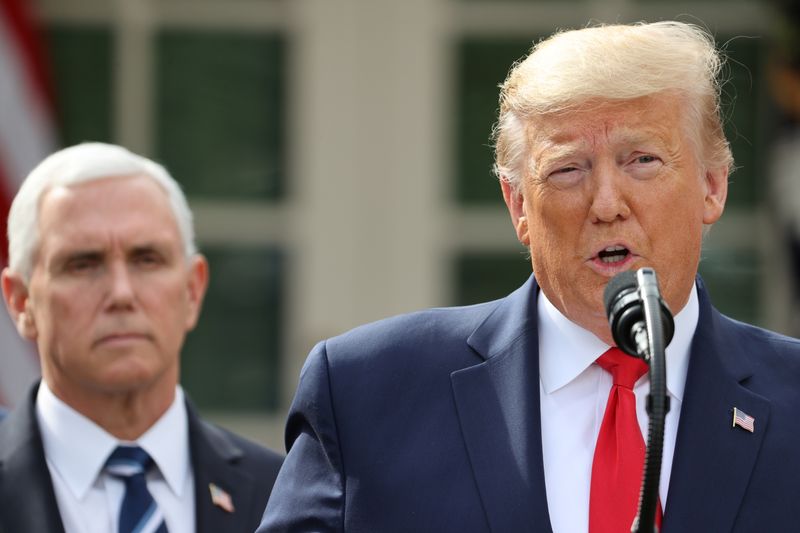By Steve Holland and Tom Westbrook
WASHINGTON/SINGAPORE (Reuters) - President Donald Trump declared a U.S. national emergency over the quickly spreading coronavirus on Friday, opening the door to more federal aid to combat a disease that has infected 138,000 people worldwide and left more than 5,000 dead.
The impact of the coronavirus on everyday life deepened around the world, and it was detected for the first time in several more countries.
More schools and businesses closed to try to slow its spread, governments took other drastic steps, the global sporting calendar was left in tatters and people faced greater restrictions on where they could go.
"To unleash the full power of the federal government to this effort today, I am officially declaring a national emergency - two very big words," Trump said in remarks at the White House.
He said the action will open up access to up to $50 billion in funds for states and localities in the fight against the coronavirus. Trump also urged states to establish emergency operations centers.
Trump had faced criticism from some experts for being slow and ineffective in his response to the crisis and downplaying the threat.
Trump's declaration of a national emergency, a seldom-used presidential power, enables the Federal Emergency Management Agency (FEMA) to assist state and local governments and coordinate the U.S. response to the crisis. The virus has killed 41 people in the United States.
The final global economic cost remains unknown, but travel bans have hammered airlines and travel companies, while financial markets have been hit by panic selling.
Despite a limited recovery on Friday, the main U.S. stock indexes faced their biggest weekly declines since the 2008 financial crisis, and remain around 25% below the record highs achieved in mid-February.
The World Health Organization (WHO) called Europe the epicenter of a coronavirus pandemic after the number of cases in China, where it originated, slowed to a trickle. The WHO called the death toll reaching 5,000 globally "a tragic milestone."
The WHO's top emergency expert Mike Ryan said social distancing was a "tried and tested method" to slow the spread of a virus but "not a panacea" that would stop transmission.
"Blanket travel measures in their own right will do nothing to protect an individual state," Ryan said.
In Washington, the Democratic-led U.S. House of Representatives will pass a coronavirus economic aid package on Friday, House Speaker Nancy Pelosi said, but it was unclear whether Trump and his fellow Republicans would support it. The package would provide for free coronavirus testing and two weeks of paid sick and family leave for those affected by the virus, Pelosi said.
CULTURAL LANDMARKS
More cultural landmarks were being closed to try to stop the spread of the virus. In Paris, the Eiffel Tower, the Louvre museum and the Moulin Rouge cabaret closed their doors. The Smithsonian museums in Washington were preparing to do so on Saturday and Broadway theaters in New York went dark.
Central banks worldwide acted to shore up money markets after cratering share prices drove a rush for cash, hitting many regional currencies and threatening a surge in short-term borrowing costs.
In China, which bore the brunt of the economic fallout from the coronavirus in the first few months of 2020, authorities late on Friday cut banks' reserve requirements for the second time this year.
Japan's central bank pledged to buy 200 billion yen ($1.90 billion) of five- to 10-year Japanese government bonds and also inject an additional 1.5 trillion yen in two-week loans.
The European Union said it would establish a 37 billion euro investment initiative as part of a package of measures to cushion the bloc's economies from the impact of the coronavirus.
In Italy, which after China has been hardest hit by the coronavirus, the death toll jumped by 250 to 1,266 in the last 24 hours, the Civil Protection Agency said.
The total number of cases also rose to 17,660 from a previous 15,113, despite draconian measures across the country to restrict the movement of people.
In the northern region of Lombardy, at the heart of Italy's coronavirus epidemic, authorities asked for even stricter steps.
In hard-hit Iran, security forces will empty the streets in cities across the country in a drive to fight the virus' spread, state television reported.
The virus continued its persistent march across the globe. Kenya, Ethiopia, Sudan and Guinea all confirmed their first cases, giving the disease a foothold in 18 countries on the African continent. Venezuela and Kazakhstan also confirmed their first cases.
In Washington, the State Department summoned the Chinese ambassador to protest comments by a Chinese foreign ministry spokesman saying the American military might have brought the coronavirus to the city of Wuhan, ground zero of the outbreak.
In a further indication of progress in China, Wuhan reported just five new cases on Friday, the second straight day the tally has been under 10.
OLYMPICS WILL PROCEED
World leaders, sports stars and actors were among the tens of thousands of people hit by the virus. Golf's jewel in the crown, The Masters, and England's top-flight soccer league joined the long list of elite sporting events to be canceled or postponed.
Spain's La Liga, Italy's Serie A and the French Ligue 1 are all on hold and Germany's Bundesliga followed suit on Friday.
But sport's biggest showpiece, the Olympics, will proceed as planned, according to Tokyo organizers.
Responding to Trump's earlier comments that the event could be delayed for a year, Japanese Olympic minister Seiko Hashimoto told reporters: "The IOC and 2020 organizers are not at all considering cancelling or postponing the Games."
In Greece, home of the ancient Olympics, the nation's Olympic Committee canceled the remainder of the Olympic Torch relay through the country.
